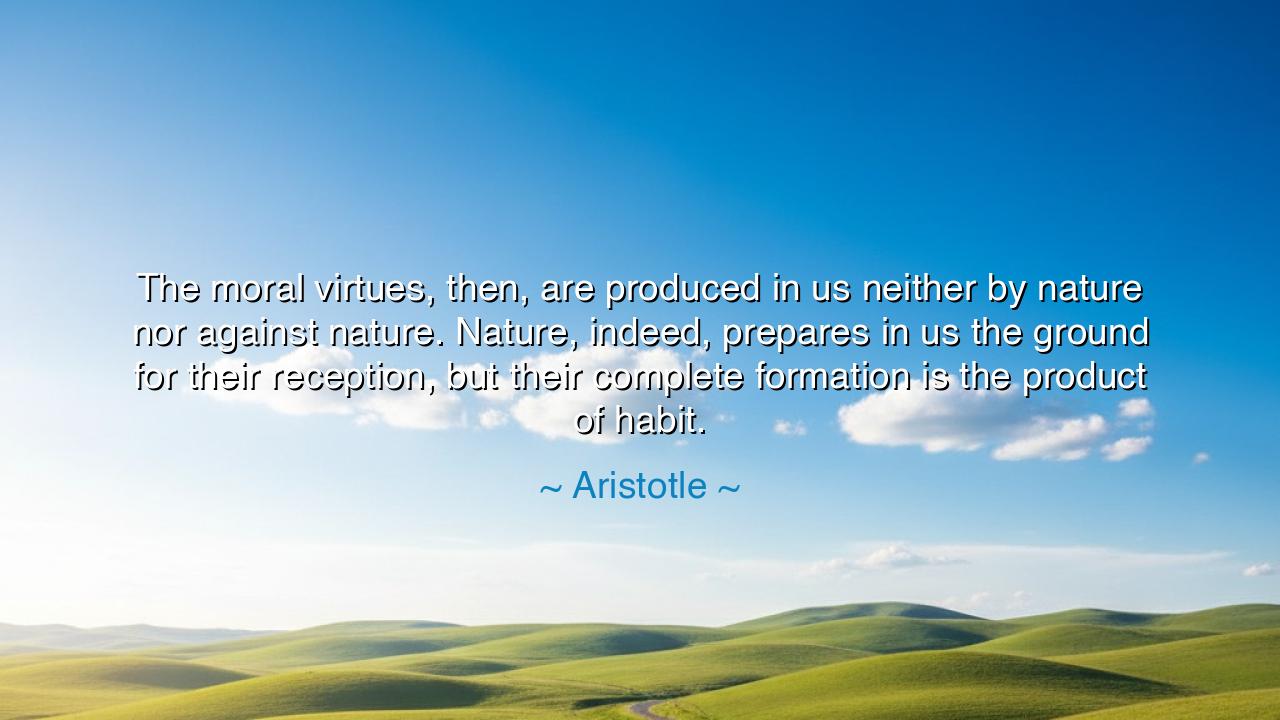
The moral virtues, then, are produced in us neither by nature
The moral virtues, then, are produced in us neither by nature nor against nature. Nature, indeed, prepares in us the ground for their reception, but their complete formation is the product of habit.






The words of Aristotle, uttered long ago in the sunlit courts of Athens, have endured as guiding torches for the souls of men: “The moral virtues, then, are produced in us neither by nature nor against nature. Nature, indeed, prepares in us the ground for their reception, but their complete formation is the product of habit.” Here, the great philosopher teaches us that virtue is neither born fully formed within us, nor forced upon us from without, but is a path carved by the steady footsteps of repeated action.
Aristotle saw that nature grants us the soil—the raw potential, the seedbed of courage, justice, temperance, and wisdom. But these seeds do not bloom on their own. Left untended, the ground grows wild with weeds: passions unchecked, appetites unruled, desires turned inward to ruin. Only through habit, the repeated choice of what is noble over what is base, can the virtues take root, grow strong, and finally bear fruit. Just as a blacksmith shapes iron by hammer and fire, so too does the soul become noble through the forge of daily discipline.
It is a truth we see even in the rise of empires. Consider the story of the Roman general Cincinnatus, who was called from his plow to defend the Republic. He did not awaken suddenly with courage; it was a virtue cultivated through years of duty, discipline, and sacrifice. Having saved his people, he laid down power and returned once more to his fields. This was not chance, nor instinct, but the force of habitual virtue—the reflex of a man trained to put honor above gain, service above self. Thus the habits formed in the quiet seasons of life prepared him for the thunderous call of history.
Aristotle’s teaching pierces through the illusions of mankind. Many excuse their faults with the cry, “I was born this way!” Others despair, saying, “I cannot change.” But the philosopher declares: you are neither chained to your nature nor condemned by it. Nature prepares; habit completes. The coward may become courageous, the selfish may become generous, the weak may become steadfast—if only they take up the work of daily discipline. By practice, the crooked tree may be straightened, and by repeated bending of the will toward the good, the soul becomes aligned with the divine order.
Yet beware, for the sword cuts both ways. Just as noble habits build virtue, corrupt habits build vice. The man who indulges daily in sloth shall find his spirit bent toward weakness. The one who feeds greed shall grow into a miser. Habit, like water carving stone, shapes us whether we will it or not. Therefore, let each choice be weighed, for each act is not isolated, but a step in the formation of the eternal self.
The lesson, then, is clear: do not wait for greatness to descend upon you like a gift from heaven. Walk the path of virtue with deliberate steps. Begin small: choose honesty when deceit would be easier; offer kindness when anger beckons; practice temperance when desire rages. These small victories, repeated, will form a character unshakable, a soul that stands firm when the storms of life descend.
Let every man and woman therefore take this to heart: greatness is not granted in a single breath, but woven, thread by thread, into the fabric of our days. As the ancients taught, we become what we repeatedly do. So let us do what is noble, again and again, until virtue is not a mask we wear, but the very marrow of our being. Then, and only then, shall we walk as true heirs of wisdom, reflecting the eternal harmony that Aristotle saw and sought to pass down to all generations.






AAdministratorAdministrator
Welcome, honored guests. Please leave a comment, we will respond soon